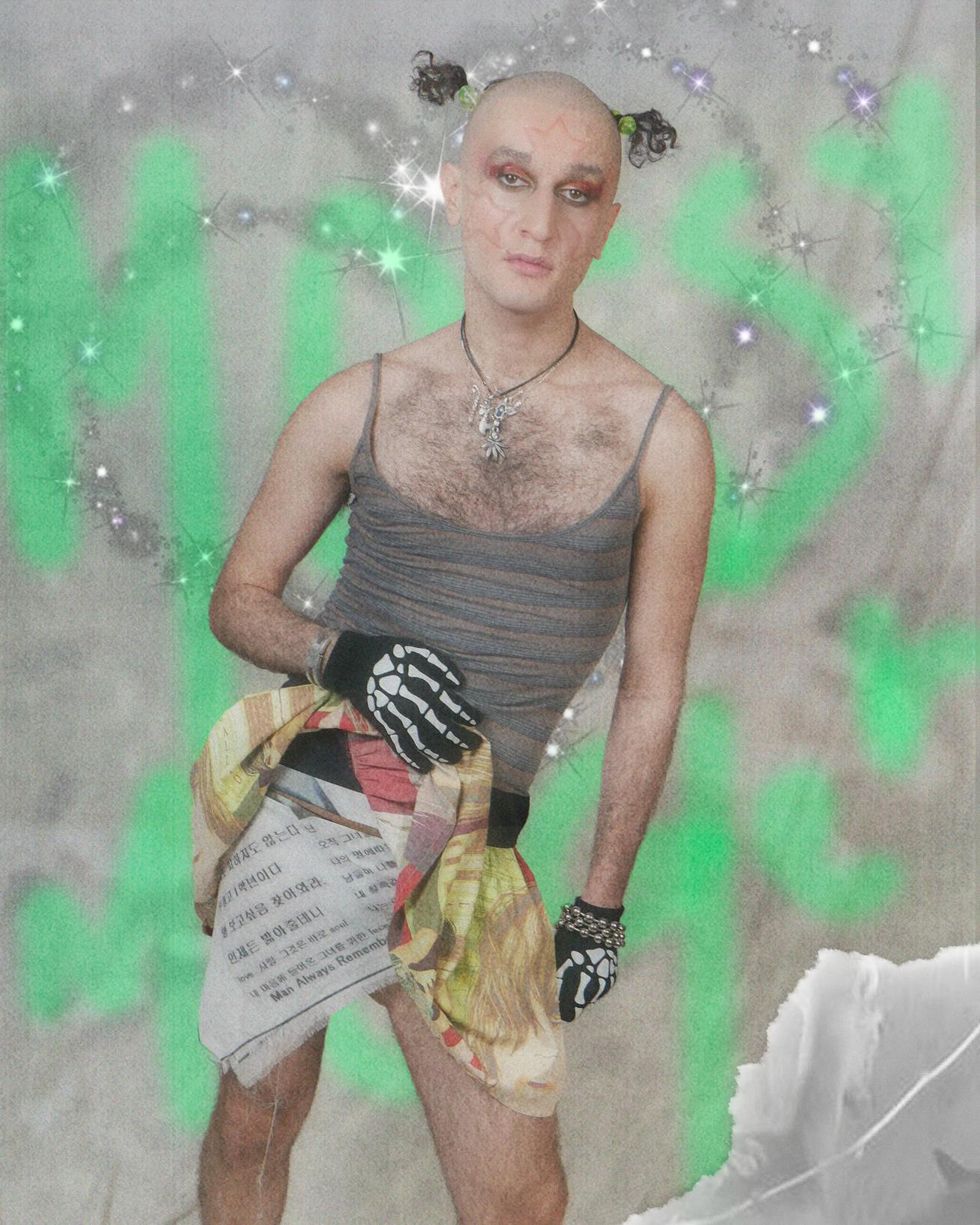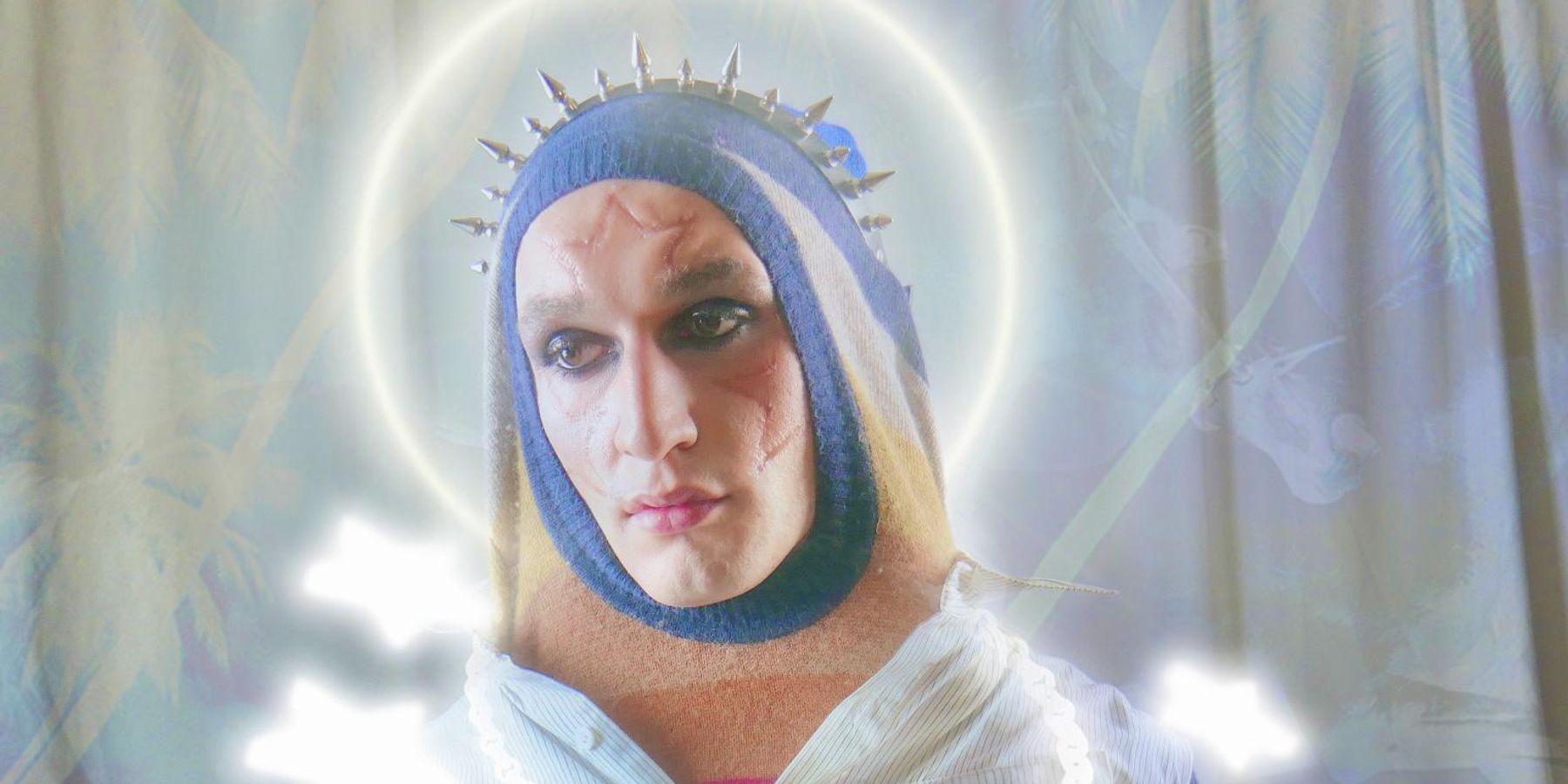
If you find yourself at a hazy warehouse rave in an abandoned New York district, where vibrations of electronica punch through dense air and industrial walls, there's a big chance you're witnessing Monib Abdul's Mossy Mugler project in full force.
Born in Qatar, and of Palestinian descent, the DJ turned producer has always had to tread the lines between risqué and sanctified self-presentation. After multiple failed attempts to carve out a protected lane with their religious family, Abdul realized that the home they were given at birth wasn't a home that allowed them to thrive, and relocated to Canada.
Through radical self-discovery and several trips to New York, they've since been able to create their own world with juiced-up vogue beats, glitchy ballads and spirited techno, like on their debut Rockstar EP, out now.
The five-track project, which Abdul independently created in one room, is their hyper-dimensional, fully fleshed out "cunt" experience. Each track is unlike the last, as the artist plunges into extreme, yet tender, expression that's perfect for escaping on the dance floor ("Poppers") or crying in the bathroom "(Bitch) I'm Sad").
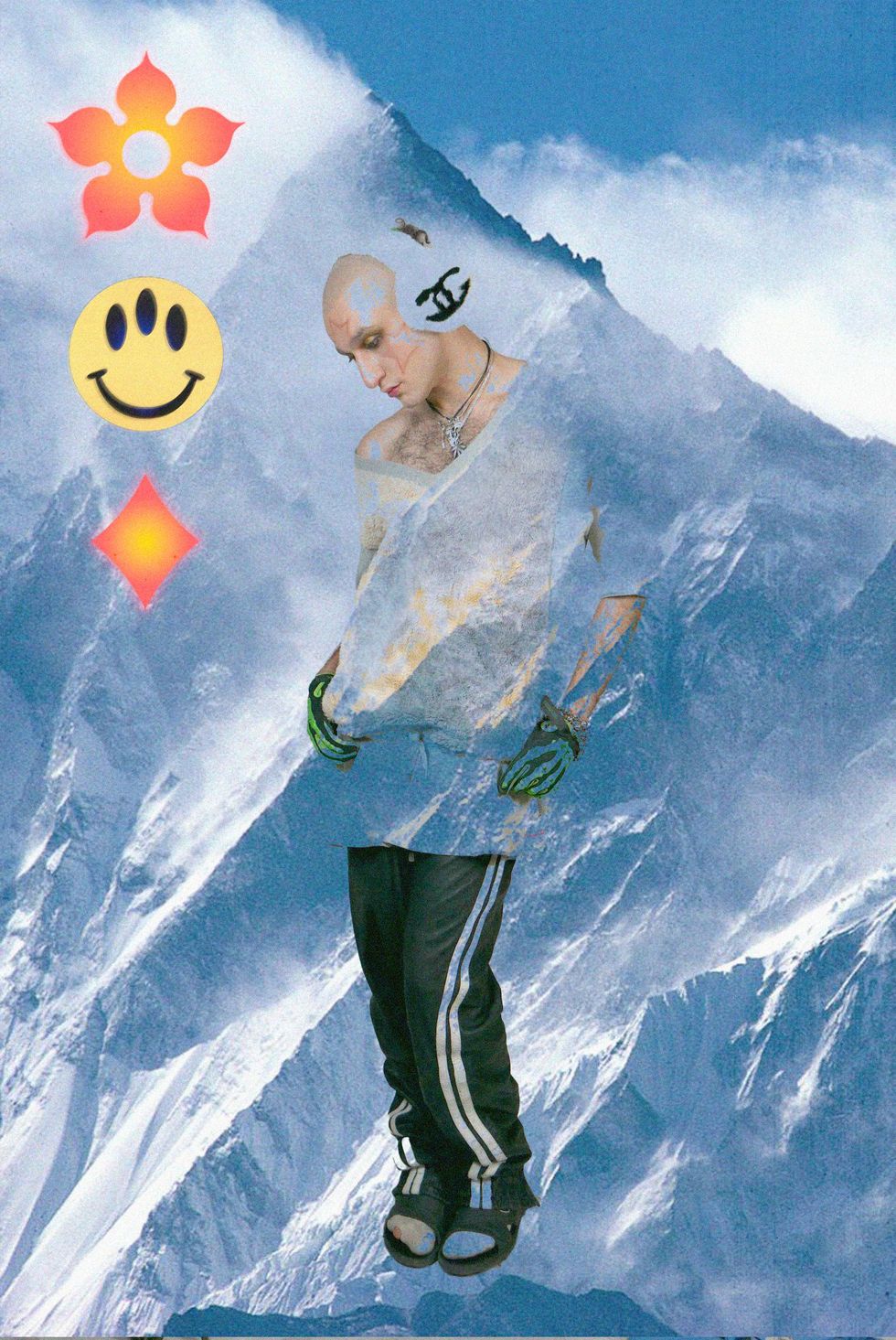
PAPER caught up with the underground star, below, to talk about their strict Muslim upbringing, nostalgic love for Top 40 pop and getting temporarily banned from entering the US.
Where are you from?
I'm Palestinian, but I was born and raised in Qatar, and I moved to Canada in 2015.
What was the music scene like in Qatar?
There was no underground, alternative, indie-cool scene. I was only exposed to whatever was on the radio, so Top 40 was my introduction to loving music. That's kind of how I shape what I do now, that nostalgic feeling from Top 40 that I had access to growing up: Tove Lo was always doing radio hits, Lady Gaga, classic Beyoncé singles like "Halo, Miley Cyrus. Lowkey Jordan Sparks also ate in Qatar. I used to love Lady Gaga, that was my first album.
Scrolling back on your Instagram, it seems like you grew up quite religious, but then around 2018 is when you started to become a little bit more risqué. What shift was happening then?
I did grow up religious. My mom was always really strict with us, like she always tried to force us to read the Quran or pray five times a day or go to the mosque every Friday. There was no option, but to do any of that. And then in 2018, I started coming to Montreal. I started finding myself, like who I am on the inside and finding the tools to express myself properly. But what it meant for me to express myself was to connect that part of my identity. Growing up strict Muslim and not having lots of access to be humorous about my identity and integrating that with this person I'm trying to express myself as truly. I've always been a humorous girl, I've always tried to push jokes. I'm a Sagittarius, so I always push jokes sometimes too far. I think in 2018 I moved to Montreal and I found my community, and that pushed me to really be myself more and that means poking at the religious things that were part of my childhood.
People often suffer from a lot of religious guilt, and you turned it around and converted it into something that you can play with or use to your advantage. Do you remember the first thing you did where you went out — whether it was wearing makeup, wearing a dress — and having a moment of I'm not supposed to be doing this?
I never really sat down with myself and said, "I shouldn't be doing this." I always sat down with myself and was like, "How am I gonna explain this to my mom If she finds out?" And actually in 2018, I posted a picture of me with no shirt, fishnets on and ripped jeans, and my family, like one of my cousins, took a screenshot of that photo and sent it in the family group chat. I worked so hard to block every single family member and somehow they still found my account. That was this whole drama that unfolded that I'm still dealing with the repercussions of today. But I never questioned expressing myself, I always thought that was my main priority.
I guess growing up, I wasn't allowed to really express myself. I went to a strict school and my mom back home wasn't really lenient in any way. She wasn't for the arts, she wasn't for the cunt. So when I moved out of Qatar and finally found a little bit of leeway to express myself, I really stuck with it and it was one of the only things that made me happy. So I wouldn't sacrifice it for anything.
It's funny because you didn't say, "Damn, this is gonna get me in trouble, I should stop." You were like, "Let me add a little more."
I had nothing to lose. When they screenshotted it and sent it to the family, my family reacted so horribly, like my uncle stopped talking to my mom. My grandparents were having back-to-back phone calls with me about how I should straighten myself out and my cousin stopped inviting us to important events. One of my aunts was like, "You're not my brother's kid, I don't know you." It was really extreme. I had already lost that family union vibe, so I had nothing else to lose. All I had was expressing myself. If I gave up that, then I give up everything and I wasn't willing to do that for anyone, not even my family. I went through tough times because of it, but I came out with a stronger stand in my being and in my ground. I forced them to respect me. I think at this point of my life, they're starting to finally open back up again and let go of all the stupid little shit they held me accountable for.
Your music journey is very interesting: you started off on Virtual DJ, then you brought a proper mixer, then you brought a Mark Pro Mix 3 and then you started working with Serato. How did you slightly progress up in software programs and how long did it take?
I love that you know the kind of controller I had. I started off on Virtual DJ and I was inspired by one of my ex-friends from here. I was like, "Okay, I want to make music, I want to be a part of this community that I love so much," because that's around the time I started raving and going out and partying, going to clubs. I fell in love with music all over again. When I started coming to Montreal, I was exposed to the underground music scene, techno and ballroom. It was music I'd never heard before, but I was like, "Wait, this is really cunt," and something that I feel is in tune with how I feel on the inside. So I started on virtual DJ and then I made mixes on Serato.
Then I was like, "I'm kind of tired of being a DJ, I feel there's more in me that I want to express that I don't think songs that other people made can do for me." So I took Ableton lessons with my good friend, Margot. She taught me how to use Ableton and that's how I started producing music.
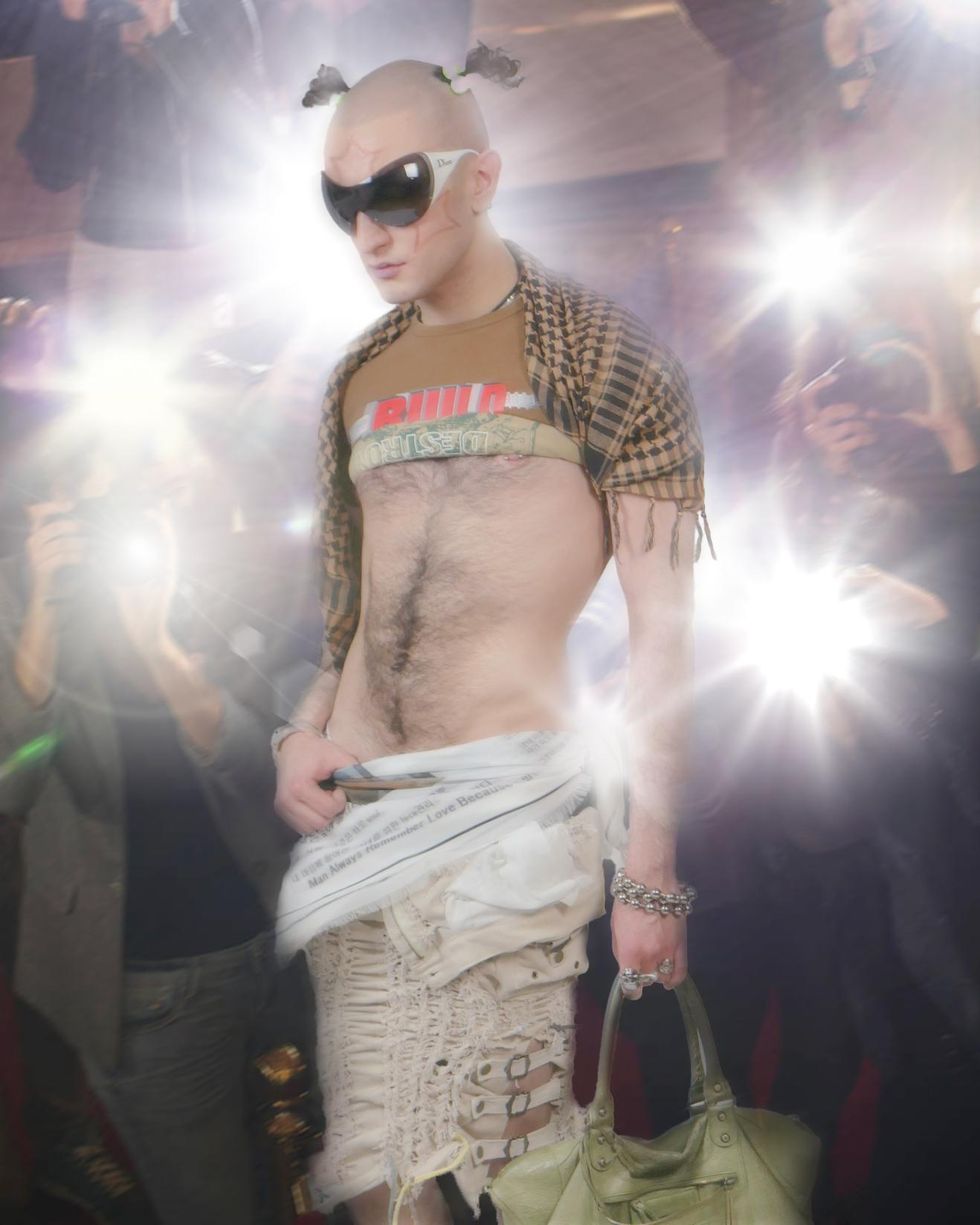
What do you remember being your biggest obstacle when you started off?
I think I still share the same obstacles. I don't really like my inner voice, it's my inner saboteur. It's tea because I think I get in my head a lot and tell myself that I'm not good, or I tell myself that "I made this great mix on a whim and that's how I did the mix." It's not because I have taste and I'm good at what I'm doing. Getting over my inner critic is the hardest struggle I've faced with music and convincing myself that I'm good.
Do you think there's anything you can do to quiet that voice?
I have to work on my own personal trauma that led me to have these types of thoughts, outside my career. And then being able to work on myself, self-reflecting, and understanding what I'm doing is creative and self-expressive. Having access to that is already a huge privilege, which is a good reminder. Working on yourself by yourself is important outside your career and then whatever you learn about yourself, apply to your art.
Let your art be reflective of your current state of mind. A lot of people use their art to settle down the stress. For example, "(Bitch) I'm Sad," my single off my EP, I made right after I got into a huge fight with my mom about my identity and who I am as a person. I did a soft coming out in quarantine, and fast forward, me and my mom were fighting about probably something to do with something I posted on Facebook. Then I hung up the phone and picked up my mic on my Beats headphones, and I was just like, "Ugh, bitch I'm sad." I was like, "Wait, that's kind of catchy." That's how "(Bitch) I'm Sad" was born. It was me expressing my sadness and trying to heal through music.
How did you find a community within the music scene in New York?
In New York, I met Pauli [Cakes], who runs Discakes, now XCAKES. I went to Pauli's housewarming party and I really loved their energy. I think they inspired me in so many ways to be myself and lead with love. This was actually my first time in New York, ever. I hit them up and I built that relationship slowly, that relationship's been nothing but a blessing. I love Pauli with all my heart and they inspired me every single day to be a better person. How they organize and throw parties inspired me to throw my own parties. It gave me an understanding of mixing nightlife with self-expression in a way that I don't really see anywhere else.
Did you make Rockstar alone or in collaboration with your friends and community?
I pretty much did it solo. I would show my friends different songs here and there, but I never really shared it with more people than that. It's so personal to me and I'm really nervous about it coming out, but yeah, I did it in this room right here.
While you were in your prime of making music in the states and playing shows, you were temporarily banned from the US. How did that impact the growth of your music or how you foresaw your career?
I got caught at the border and was interrogated for seven and a half hours, and then I was banned for six months. The ban wasn't permanent, so that was a blessing. For me, I'd been trying to live in New York for five months and I went to go visit my mom in Qatar. When I came back to New York they took me into interrogation at the airport and they were like, "Why have you been here for so long? What are you doing in the states? How are you making money if you're just a tourist?"
After I got temporarily banned for six months, when I came back to Canada I felt like my life was lacking a lot of sustenance because I associated New York with being able to access the industry, but that's not true. My talent is what's gonna help me access the industry and I had to learn that slowly. But it pushed me hard to focus on my art and focus on getting out of the situation that I was in. It inspired me to work, work harder on myself and work harder on my music. Shortly enough that six months was over and I was back.
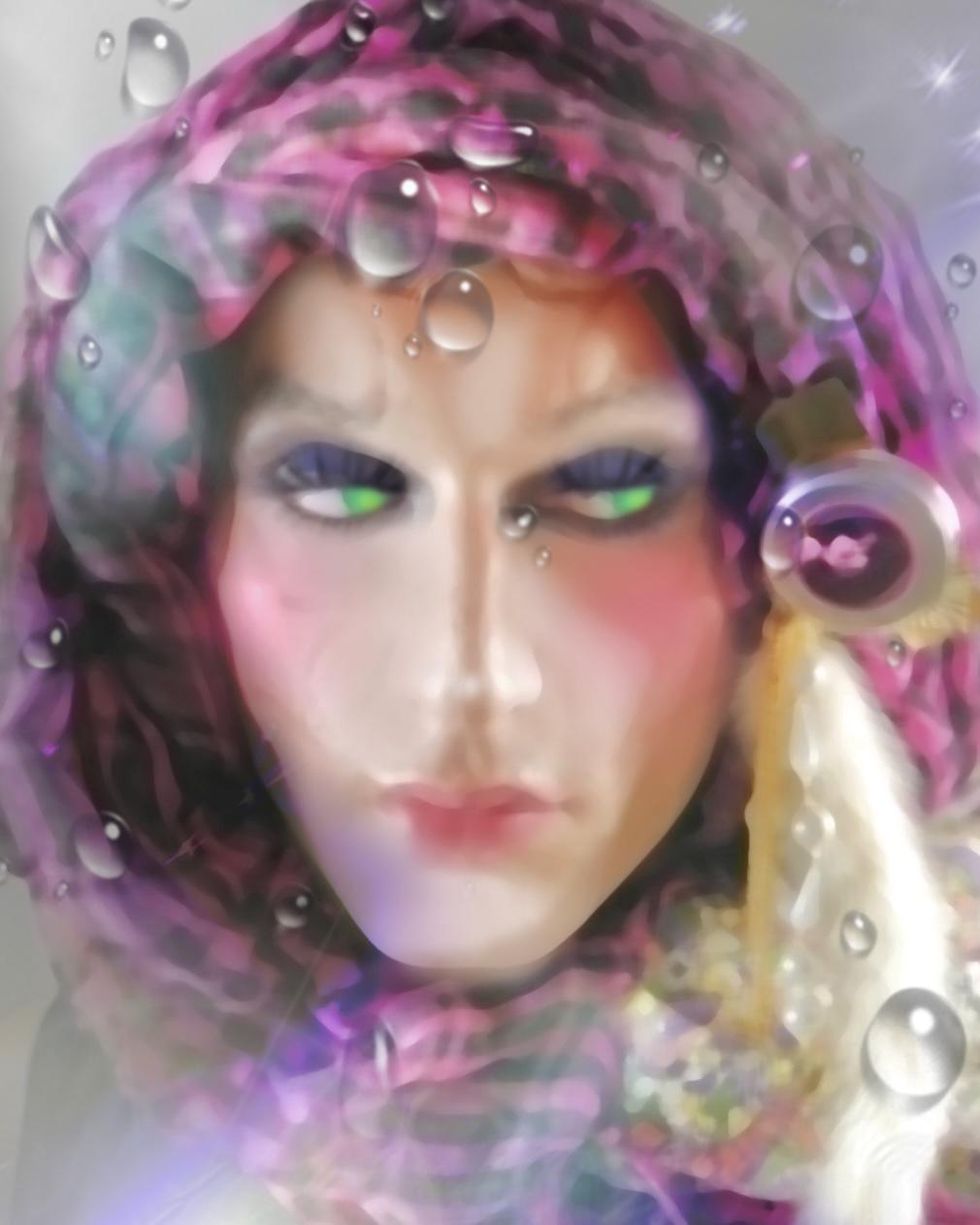
How did nightlife specifically impact this EP?
I'm a nightlife person and I go to clubs, raves and parties, and I am a part of that community. It gave me the tools to express myself fully to my capacity in so many different ways. The different kinds of scenes in nightlife that I've explored are either the drum and bass, fast pace girls or the house girls or the punk girls or the hardcore techno girls or the new age DJ doll-like cunty girls. And I love music so much, I love all different kinds of music, so being well-versed in different communities, different music scenes and also having an innate sense of identity helped shape my sound.
Do you think you'll ever make music that's more personal and complex, or do want to keep it as a source of escapism?
For my next project outside of the EP, I definitely want to start writing into my songs more and using lyrics as a tool to express myself even further. But for this EP specifically, it correlates with certain experiences that I had in that moment that I was making that EP. For example, "Drunk," I was on FaceTime with my girl, we were talking about getting drunk at home by yourself and she was like, "You've never gotten drunk at home?" I was telling her I never got drunk by myself at home, so I literally did. I went to the supermarket next to my house, got a bottle of wine and drank it. I got drunk and then I made that song. It really varies, like topics on my EP could be reflective of a sad and vulnerable moment, like "(Bitch) I'm Sad," or it could just be fun and nutty experiences with my friends, like "Drunk."
There are no lyrics throughout the project, but you did choose to use a sample at the end of "Telephone." What's the importance of that?
When I was making "Telephone," I had creative block towards the middle of the song. I was like, "I don't know what to do here, what's the tea?" And then I run across the sample of this funny mental health hotline video on YouTube. It described every single mental health [disorder] and then it told them to dial in the numbers based on that. I thought it was really funny and it summed up exactly how I felt. It made fun of something that I take so seriously. I thought it was a really nice way to end the EP. It's so true to my being and expressive of my feelings on a lighter note.
Three words to describe each song off Rockstar:
"Poppers:" Dazed, confused, hardcore.
"Rockstar:" Rockstar, ADHD, cunt.
"(Bitch) I'm Sad:" Sad, aggressive, healing.
"Drunk:" Drunk, chaotic, fast-paced.
"Telephone:" Dance, funny, creative.
Three words for the whole project:
Bad bitch central.
